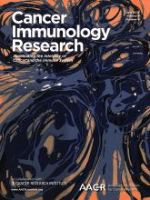
Cancer Immunology Research
Scope & Guideline
Elevating Knowledge in Cancer and Immunology
Introduction
Aims and Scopes
- Cancer Immunotherapy Mechanisms:
The journal extensively covers the mechanisms of various cancer immunotherapies, including checkpoint inhibitors, CAR T-cell therapies, and immune-modulating agents, highlighting their biological underpinnings and clinical implications. - Tumor Microenvironment Dynamics:
Research frequently addresses the role of the tumor microenvironment in modulating immune responses, including studies on immune cell infiltration, metabolic reprogramming, and interactions between tumor and immune cells. - Translational Research and Clinical Applications:
Cancer Immunology Research bridges basic research and clinical applications, providing insights into how laboratory findings can be translated into effective treatments, including novel vaccine strategies and combination therapies. - Genomic and Proteomic Insights:
The journal publishes studies that leverage genomic and proteomic technologies to identify biomarkers and therapeutic targets, enhancing personalized medicine approaches in cancer treatment. - Emerging Technologies in Immunotherapy:
There is a strong emphasis on innovative technologies, such as CRISPR gene editing, single-cell sequencing, and machine learning applications, aimed at improving the efficacy and safety of cancer immunotherapies.
Trending and Emerging
- Combination Immunotherapy Approaches:
There is an increasing focus on combination therapies that integrate various immunotherapeutic strategies, such as combining checkpoint inhibitors with CAR T-cell therapy or other immune modulators, to enhance overall treatment efficacy. - Microbiome and Immunotherapy Interactions:
Recent studies are exploring the role of the gut microbiome in modulating immune responses to cancer therapy, revealing how microbial communities can influence treatment outcomes and immune system dynamics. - Personalized Cancer Vaccines:
The development of personalized cancer vaccines based on individual tumor neoantigens is gaining prominence, emphasizing tailored approaches to immunotherapy that leverage specific patient tumor profiles. - Role of Metabolism in Immune Function:
Research increasingly focuses on the metabolic pathways of immune cells in the tumor microenvironment, exploring how metabolic reprogramming can enhance or inhibit anti-tumor immunity. - Single-Cell and Spatial Transcriptomics:
The application of single-cell RNA sequencing and spatial transcriptomics is becoming more prevalent, providing deeper insights into the cellular composition and functional states of immune cells in tumors, which is crucial for understanding resistance mechanisms.
Declining or Waning
- Traditional Chemotherapy Studies:
Research focusing on traditional chemotherapy alone, without immunological context, appears to be decreasing, as the field shifts towards understanding how to synergize chemotherapy with immunotherapy. - Basic Descriptive Studies on Tumor Cells:
There has been a noticeable reduction in purely descriptive studies regarding tumor cell biology, with a greater emphasis now placed on functional studies that explore the tumor-immune interaction. - Standalone Immunomodulatory Agents:
The focus on isolated immunomodulatory agents, without combination strategies or contextual understanding of their mechanisms, is less prevalent, indicating a trend towards integrated approaches in immunotherapy. - General Immune Response Studies:
Research that broadly addresses immune responses without specific relevance to cancer immunology or therapy is becoming less common, as the journal favors studies with direct implications for cancer treatment.
Similar Journals

ImmunoTargets and Therapy
Pioneering Discoveries in ImmunotherapyImmunoTargets and Therapy is a leading open access journal published by DOVE MEDICAL PRESS LTD, dedicated to advancing the field of immunology and its various therapeutic applications. Since its inception in 2012, the journal has rapidly become a vital resource for researchers, professionals, and students, achieving notable recognition with a Q1 ranking in both Immunology and Immunology and Allergy categories as of 2023. With an impressive Scopus ranking of #22 out of 233 in Medicine - Immunology and Allergy, and #25 out of 236 in Immunology and Microbiology, this journal maintains a 90th percentile standing in its field. ImmunoTargets and Therapy not only publishes original research articles, reviews, and clinical studies, but also fosters an inclusive platform for the dissemination of innovative findings critical to the fight against immunological disorders. Based in New Zealand, it serves a global audience, promoting knowledge exchange and collaboration through its open access model.

INTERNATIONAL JOURNAL OF ONCOLOGY
Connecting researchers and clinicians in the fight against cancer.INTERNATIONAL JOURNAL OF ONCOLOGY is a leading academic publication dedicated to advancing the field of cancer research and treatment. Published by SPANDIDOS PUBL LTD in Greece, this journal, with ISSN 1019-6439 and E-ISSN 1791-2423, has established itself as a reputable source of peer-reviewed articles since its inception in 1993. With an impressive Q2 ranking in both Cancer Research and Oncology categories, as well as high Scopus ranks reflecting its significant contribution to the fields of Medicine and Biochemistry, the journal offers a platform for researchers, clinicians, and students alike to disseminate their findings and engage in dialogue surrounding innovative practices and breakthroughs. Although the journal follows a traditional subscription model, it continues to attract a diverse readership interested in the latest developments in oncological research, providing essential insights into cancer biology, therapeutics, and patient care. With a commitment to excellence, the INTERNATIONAL JOURNAL OF ONCOLOGY plays a vital role in shaping the future of oncology research and is a must-read for anyone passionate about advancing cancer treatment and prevention.

PATHOLOGY RESEARCH AND PRACTICE
Innovating Diagnostics and Forensic InsightsPATHOLOGY RESEARCH AND PRACTICE is a premier journal in the field of pathology and forensic medicine, published by Elsevier GmbH in Germany. With a rich publication history since 1978 and an impressive convergence period extending to 2024, this journal serves as a vital resource for researchers and professionals dedicated to advancing the understanding of pathological processes. It holds notable rankings, including Q3 in Cell Biology and Q2 in Pathology and Forensic Medicine for 2023, reflecting its significance in the academic community. The journal aims to publish innovative research findings, reviews, and case studies, facilitating a deeper understanding of disease mechanisms and improving diagnostic practices. Authors and readers alike benefit from its reputable platform, noted for its challenging and rigorous peer-review process. By fostering a collaborative environment and providing open access options, PATHOLOGY RESEARCH AND PRACTICE continues to contribute meaningfully to the discourse within its respective fields, thereby appealing to a diverse audience of researchers, professionals, and students.
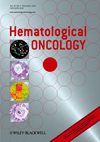
HEMATOLOGICAL ONCOLOGY
Transforming Knowledge into Practice in Hematological OncologyHEMATOLOGICAL ONCOLOGY, published by Wiley, is a premier journal in the fields of cancer research, hematology, and oncology, with a rich history of publication dating back to 1983. With an impact factor indicative of its influential standing—ranking in the second quartile in multiple categories including Cancer Research, Hematology, and Oncology—this journal serves as a vital resource for researchers, clinicians, and students alike. HEMATOLOGICAL ONCOLOGY is based in the United Kingdom and focuses on the advancements and challenges in the understanding and treatment of hematological malignancies. While it does not offer open access options, its rigorous peer-review process ensures that all published articles are of the highest quality, contributing to the ongoing dialogue and research in this critical area of medicine. With its commitment to disseminating impactful research, HEMATOLOGICAL ONCOLOGY remains an essential platform for driving innovation and collaboration within the global scientific community.
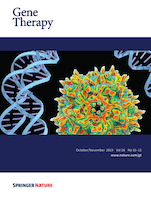
GENE THERAPY
Transforming Healthcare Through Genetic InsightsGENE THERAPY, published by SpringerNature, is a prestigious academic journal at the forefront of research in the fields of genetics, molecular biology, and molecular medicine. Since its inception in 1994, this journal has evolved into a vital resource for scholars, practitioners, and students, providing cutting-edge insights into gene therapy techniques and innovations. With an impressive impact factor reflecting its significant influence— ranking in the Q1 quartile across multiple categories in 2023—GENE THERAPY offers rigorous peer-reviewed articles that address both basic and applied aspects of gene therapy. The journal is recognized for its role in promoting advancements in therapeutic strategies, thus enhancing understanding of genetic disorders and treatment efficacy. Researchers will find this journal invaluable for publishing their findings, staying updated on the latest breakthroughs, and fostering interdisciplinary collaborations. Engage with the latest in gene therapy by accessing this influential platform, and contribute to a field that holds the potential to transform healthcare outcomes worldwide.

CRITICAL REVIEWS IN IMMUNOLOGY
Exploring the Nuances of Health and DiseaseCRITICAL REVIEWS IN IMMUNOLOGY, published by BEGELL HOUSE INC, is an essential journal in the field of immunology that has been contributing to the scientific discourse since 1980. With its ISSN 1040-8401 and E-ISSN 2162-6472, this journal provides a platform for critical analysis and comprehensive reviews that deepen understanding of immune responses and their implications in health and disease. Although currently categorized in the Q4 quartile for Immunology and Q3 for Immunology and Allergy, the journal's quality research and scholarly contributions are crucial for advancing knowledge within its fields—encompassing various aspects of innate and adaptive immunity. Researchers and professionals in immunology will find invaluable insights, aiding them in their quest for innovation and excellence, as the journal aims to foster interdisciplinary collaboration. While it does not operate on an open-access model, CRITICAL REVIEWS IN IMMUNOLOGY remains a significant resource for those dedicated to pushing the boundaries of immunology, with annual publications expected to last well into 2024 and beyond.

IMMUNOLOGIC RESEARCH
Pioneering Discoveries in Immune Function and DiseaseIMUNOLOGIC RESEARCH, published by Springer, is a prestigious journal dedicated to advancing the field of immunology. Since its inception in 1986, this journal has provided a vital platform for researchers, practitioners, and students to share groundbreaking studies and innovative findings that influence clinical and laboratory practices in immunology. With an impact factor that reflects its importance, being ranked in the Q2 category for the year 2023 and positioned at 98th out of 236 in Scopus rankings for Immunology, it is recognized among its peers for the quality of its publications. The journal emphasizes rigorous peer review and encourages submissions across a diverse range of topics including but not limited to immune responses, vaccine development, and disease mechanisms. Though it does not currently offer open access, its insightful articles remain crucial for professionals seeking to stay at the forefront of immunological research. Designed for a broad audience within the scientific community, IMMUNOLOGIC RESEARCH continues to foster discovery and discussion that shapes our understanding of immune function and its implications for health and disease.

Cancer Biomarkers
Advancing the Science of Cancer Biomarkers.Cancer Biomarkers is a leading journal in the field of cancer research, aimed at the exploration and identification of novel biomarkers for cancer detection, prognosis, and therapy. Published by IOS PRESS in the Netherlands, this journal serves as a pivotal resource for those engaged in oncology, genetics, and molecular biology, facilitating access to cutting-edge research and advancements within these disciplines. In its ongoing mission since 2005, the journal has become an essential reference point, currently occupying a Q3 category in Cancer Research, Genetics, and Oncology, and a Q2 category in miscellaneous Medicine fields. With its commitment to high-quality peer-reviewed articles, Cancer Biomarkers satisfies the intellectual appetite of researchers, clinicians, and students alike, contributing significantly to the ever-evolving landscape of cancer biomarker discovery and application. Though currently not available as Open Access, the journal maintains a robust presence in academic circles, underscored by respectable Scopus rankings across relevant categories.
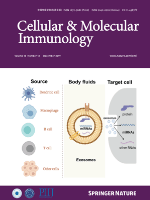
Cellular & Molecular Immunology
Elevating Research in Cellular and Molecular ImmunologyCellular & Molecular Immunology is a prestigious peer-reviewed journal published by the CHIN SOCIETY IMMUNOLOGY. As a leading journal in the fields of immunology and infectious diseases, it proudly holds a Q1 designation across multiple categories, including Immunology, Allergy, and Medicine (Miscellaneous), reflecting its commitment to excellence and impactful research. With an ISSN of 1672-7681 and an E-ISSN of 2042-0226, the journal has been essential reading since its inception in 2004, continuously gathering insights from cutting-edge studies. It ranks impressively within Scopus, with positions in the 7th, 8th, and 9th percentile in relevant categories, establishing it as a cornerstone for researchers, clinicians, and students alike. The journal offers an extensive range of original research articles, reviews, and clinical studies, ensuring that readers stay at the forefront of immunological discovery. Whether you are interested in basic immunology, infectious diseases, or evolving therapies, Cellular & Molecular Immunology serves as an invaluable resource for advancing your knowledge and engagement in this dynamic field.
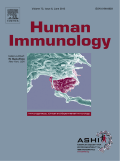
HUMAN IMMUNOLOGY
Elevating Understanding of Immune MechanismsHUMAN IMMUNOLOGY, published by Elsevier Science Inc, serves as a critical platform for disseminating research in the fields of immunology and allergy, as well as various aspects of miscellaneous medicine since its inception in 1980. With an ISSN of 0198-8859 and E-ISSN 1879-1166, this journal is pivotal for researchers and practitioners looking to advance their understanding of human immune responses and related conditions. The journal currently holds a respectable position within its field, as highlighted by its 2023 Scopus ranks—#114/233 in Immunology and Allergy and #132/236 in Immunology and Microbiology. Moreover, it maintains a Q2 quartile ranking in both Immunology and Allergy and miscellaneous Medicine, underscoring its influence and reach within the scientific community. Although it does not currently offer Open Access options, HUMAN IMMUNOLOGY remains dedicated to providing valuable insights and fostering academic discourse within its discipline, characterized by a rigorous peer-review process and a focus on innovative research trajectories.